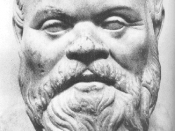Justice
INTRODUCTION
We analyze distributive justice and its different explanations as shared by Robert Nozick, John Rawls, and Michael Walzer.
THESIS
To say that justice has the same affect on everyone would be incorrect. From a relative perspective, distribution of goods is impacted by socio and economic principles. A more rational or utilitarian approach would be that distribution of goods is good if it yields the greatest happiness for the greatest number of people. We feel that unless there is control on a global scale, a total distributive justice cannot be attained.
SUMMARY
According to many philosophers, justice is connected to economics and ethics. Distributive justice concerns how and to what extent "society's goods should be distributed" (Donaldson, Werhane, and Cording, 2002, p. 137). We examine three philosophers' views on justice and their similarities. Robert Nozick claims that justice is "prejudicial and controversial" (Donaldson, et al. 2002, p.
137). John Rawls argues that justice can be obtained if everyone is involved and that inequalities must work out to the advantage of everyone affected. Michael Walzer focuses on conception and creation of justice and stresses that the meanings change; therefore, no one meaning can continue across all circumstances or societies.
ANALYSIS: JOHN RAWLS
According to Rawl, the idea of justice is to be utilitarian. One must sacrifice itself for the greater of good. In order to maximize the good the majority should be the voice of the society. Since the majority realizes what is good and satisfying for society, they feel that justice is being done for all. This is known as the principle of utility; the greatest good of the greater number should take actions and decisions for society. In order for this principle to be successful and satisfactory for all, it must be properly organized and its...



Excellent analysis!
Everything flows beautifully!
0 out of 0 people found this comment useful.